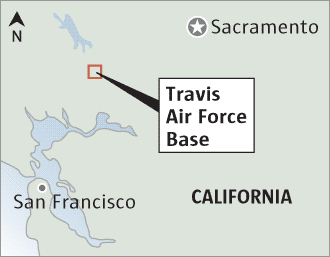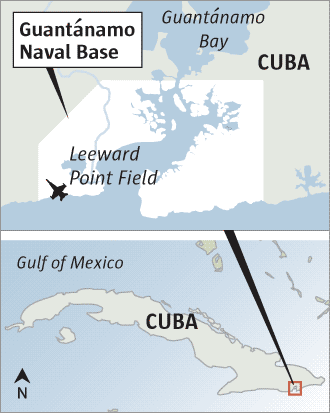— Chapter 4 —
A Witness Comes Forward
Seattle Times staff reporter
GUANTÁNAMO BAY, Cuba
Spring 2003
Capt. Jason Orlich marched into the counterintelligence office with one of his most trusted Arabic translators. They had news about Chaplain James Yee.
The linguist, a Syrian-born Christian, claimed he had overheard Yee speaking in Arabic to a detainee at the prison hospital, ridiculing the camp's psychological-operations posters.
The posters depicted images such as an Afghanistan landscape at sunset. A Pashtu caption beneath it stated: "Find your way home / Truth will land you there." Another poster showed boys in a schoolroom, above the words: "The time is now for cooperation / Return and join the future of Afghanistan."
The camp's counterintelligence office was run by Theo Polet, a 40-year-old National Guard captain from Florida. He led a small team of agents responsible for investigating subversive behavior at Guantánamo.
Polet already had received information about Yee from Orlich's intelligence section. Most of it was third-hand. But today was different.
This time, they had a witness.
Polet and Orlich saw the alleged incident as a clear attempt to undermine interrogations, or at least embolden an enemy combatant. Polet considered it a "watershed moment."
TRAVIS AIR FORCE BASE
Senior Airman Ahmad Al Halabi was a supply clerk at Travis before volunteering for Guantanamo Bay.

![]()
Outside the National Guard, Polet had been an academic coordinator at a private Florida school that taught undercover surveillance to police officers and security firms. He devoured books on terrorism, its origins and its masterminds.
The linguist filed a sworn statement. Polet knew Orlich and the translator had differences with Yee. Personality conflicts were always the first thing to scrutinize when fielding a report such as this. He also knew there had been tension between Muslims and non-Muslims in the camp's linguist section. But Polet trusted Orlich. He was someone who took his job seriously.
Polet filed a standard "Subversion and Espionage" report with the 470th Military Intelligence Group in Puerto Rico. After a long delay, the report eventually came back stamped "open-close." Polet was ordered to note the incident but take no further action.
Still concerned, Polet filed a second report. It was sent to the Army's Central Control Office in Maryland, which oversees all Army counterintelligence operations. The new report had the same central allegation but with added information Polet believed showed the poster incident was part of a pattern of subversive behavior dating back to March.
On May 30, Army Central Control ordered Polet to conduct a "preliminary inquiry."
The investigation into James Yee was officially open.
Polet took the news to Maj. Gen. Geoffrey Miller, Joint Task Force Guantánamo commander, who listened stern-faced. "He had taken to liking Chaplain Yee and spent a lot of time with him, so this was very difficult for him," Polet recalled.
His personal feelings aside, Miller set the tone for the investigation, giving Polet's agents wide latitude: "He said, 'We're here to either exonerate this individual or prove a wrong,' " Polet said.
Just as that investigation was beginning, a second probe into a friend of Yee's was shifting into high gear.
GUANTÁNAMO BAY NAVAL BASE
Capt. James Yee is sent to Guantánamo in November 2002 to serve there as a Muslim chaplain.

Photography was strictly forbidden inside Camp Delta, but the rule was occasionally broken by troops snapping "souvenir photos," recalled Col. John Perrone, former prison commander. The punishment was typically light, and the film destroyed.
But because Al Halabi was a member of the "Muslim clique," which was under suspicion by Orlich, the discovery was seen as the first key piece of evidence of possible subversion.
The camera, a simple disposable brand available at the commissary on the main base, contained two photographs: one of a guard tower; the other of a prison recreation yard. The photos were similar to pictures available over the Internet and from the camp's public-affairs office. But Orlich insisted the images were classified.
Just as the camera was discovered, questions arose about Al Halabi's security clearance.
That alone wasn't unusual. With the urgent need for Arabic speakers, many linguists working in sensitive areas at the camp were pressed into service before their security clearances had been issued.
A soldier's security clearance is processed at his or her home base. In Al Halabi's case, that was Travis Air Force Base near Sacramento, Calif., where he had served as a supply clerk before volunteering as a translator. But by May, six months after arriving, his security clearance still had not arrived.
Army Reserve Spc. Victor Wheeler, a security manager, called Travis and learned the clearance was being held up because of gaps in Al Halabi's application. Travis investigators also had questions about Al Halabi's three-month deployment the year before to Kuwait, where they believed he had tried to connect his personal laptop into a secure military network.
"So the folks at Travis are saying, 'Don't give him access,' and almost simultaneously the camera is discovered, and I'm like, 'Oh my gosh!' " Orlich recalled.
In June, the Air Force Office of Special Investigations sent a team of agents to Guantánamo to investigate. The team was led by Lance Wega, a civilian agent with about two months on the job.
In a secret search, agents combed Al Halabi's work area and his quarters. They copied his laptop's hard drive. In that and later searches, they would find nearly 200 detainee letters, a camp diagram, detainee rosters and military orders from a flight mission he had taken from Guantánamo to Afghanistan to pick up prisoners.
Other agencies soon joined the investigations into Al Halabi and Yee, including the FBI-led terrorism task forces in Seattle and Sacramento.
Agents visited Lt. Col. Orlando Goodwin, Yee's former commander, back at Fort Lewis in Washington state. They told him allegations — they wouldn't specify — had been made about Yee in Guantánamo and asked him who Yee associated with or if he had ever made anti-American statements.
"I didn't think much of it," Goodwin recalled. "I thought for the most part he's a Muslim chaplain, and somebody didn't like his Muslim background and it would all go away."
Though the various agencies, including the FBI, were sharing information, the investigations into Yee and Al Halabi were kept separate.
"It was entirely too early to even suggest formally that there might be a conspiracy happening," Polet recalled. "And if you grouped all these individuals together, you run the risk of investigating people that are simply guilty by association."
Neither Al Halabi nor Yee knew of the investigations. It's unclear if Al Halabi even realized his disposable camera was missing.
With his security clearance at issue, Al Halabi was pulled from his job translating detainee mail and placed in the library under Yee's supervision.
As the investigation unfolded, camp guards began turning in loose documents found in detainees' cells stamped "Cleared by U.S. Forces."
The documents contained prayers, poems and other writings, some of which they believed the detainees had written. Security officers were alarmed. They thought the intelligence office was the only section that was supposed to have a stamp that could clear documents for circulation.
"We're like, 'What the heck?' " recalled Wheeler, who worked under Orlich.
They soon discovered the library had its own "Cleared by U.S. Forces" stamp. They wondered where it came from. Investigators also found hundreds of photocopied pieces of paper, including blank sheets, that were pre-stamped, Orlich said.
Investigators began to wonder what this all meant. Could Yee and others in the library, including Al Halabi, be using the stamp to pass radical literature to the prisoners and to help them trade messages back and forth?
If so, there was no telling the damage such a secret communication network could have on interrogations.
Investigators immediately confiscated the library's stamp, placed it in a plastic bag, and sent it for forensic analysis to determine its origin.
What neither Orlich nor Polet knew was that the stamp had been approved for use in the library by Camp Delta's previous intelligence officer, who had purchased it off the Internet.
Even so, by July, just as Al Halabi's tour at Guantánamo came to an end, Air Force agents believed they had enough to arrest him.
The Army's investigation into Yee was moving more slowly, but investigators were becoming convinced there was a conspiracy. At the center, they believed, were the four members of the "Muslim clique": Capt. Tariq Hashim, Petty Officer Samir Hejab, Al Halabi and Yee.
Ray Rivera: 206-464-2926 or rayrivera@seattletimes.com
